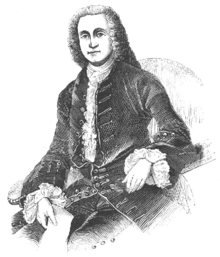George Grenville
The Rt Hon George Grenville | |
|---|---|
 | |
| Prime Minister of Great Britain | |
| In office 16 April 1763 – 13 July 1765 | |
| Preceded by | The Earl of Bute |
| Succeeded by | The Marquess of Rockingham |
| Chancellor of the Exchequer | |
| In office 16 April 1763 – 16 July 1765 | |
| Preceded by | Sir Francis Dashwood, 2nd Bt. |
| Succeeded by | William Dowdeswell |
| Personal details | |
| Born | 14 October 1712 Westminster, London |
| Died | 13 November 1770 London |
| Political party | Whig |
| Alma mater | Christ Church, Oxford Eton College |
George Grenville (14 October 1712–13 November 1770) was Prime Minister of Great Britain. He was a member of the Whig Party. He was one of the few prime ministers who never was given a title of nobility.
Grenville was the second son of Richard Grenville and Hester Temple. His older brother was Richard Grenville-Temple. Grenville went to school at Eton College and at Christ Church College, Oxford. He entered Parliament in 1741 as member for Buckingham, and represented Buckingham until his death.
As Treasurer of the Navy in 1758 he introduced and carried a bill which established a fairer system of paying the wages of sailors. He stayed in office in 1761, when Pitt resigned, and in the administration of Lord Bute acted as Leader of the House of Commons. In May 1762 he became Secretary of State for the Northern Department, and in October First Lord of the Admiralty; and in April 1763 he became First Lord of the Treasury and Chancellor of the Exchequer.
While Prime Minister, his government oversaw the prosecution of John Wilkes and the passing of the American Stamp Act 1765, which led to the first disagreements between American colonies and Great Britain that led to the American Revolutionary War.
After many years of being Prime Minister, he began to have disagreements with young king George III. The king started to think that the Prime Minister was using him as a puppet. The king convinced Rockingham to become the new Prime Minister and Grenville never held an office again.
Grenville was called the "gentile shepherd" because he bored the House by asking over and over again, during the debate on the Cider Bill of 1763, that somebody should tell him "where" to lay the new tax if it was not to be put on cider. Pitt whistled the air of the popular tune Gentle Shepherd, tell me where, and the House laughed. Though few excelled him in a knowledge of the forms of the House or in mastery of administrative details, he lacked tact in dealing with people and with affairs.
In 1749 Grenville married Elizabeth Wyndham (before 1731-5 December 1769), daughter of Sir William Wyndham. They had seven children.
